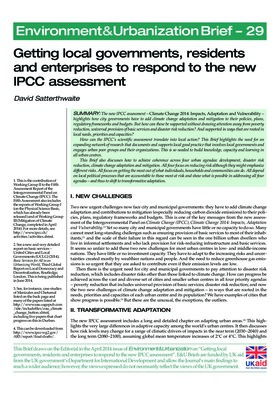Getting local governments, residents and enterprises to respond to the new IPCC assessment

The new IPCC assessment – Climate Change 2014: Impacts, Adaptation and Vulnerability ‒ highlights how city governments have to add climate change adaptation and mitigation to their policies, plans, regulatory frameworks and budgets. But how can these be supported without drawing attention away from poverty reduction, universal provision of basic services and disaster risk reduction? And supported in ways that are rooted in local needs, priorities and capacities?~How can the IPCC’s scientific assessment translate into local action? This Brief highlights the need for an expanding network of research that documents and supports local good practice that involves local governments and engages urban poor groups and their organizations. This is so needed to build knowledge, capacity and learning in all urban centres.~This Brief also discusses how to achieve coherence across four urban agendas: development, disaster risk reduction, climate change adaptation and mitigation. All four focus on reducing risk although they might emphasize different risks. All focus on getting the most out of what individuals, households and communities can do. All depend on local political processes that are accountable to those most at risk and show what is possible in addressing all four agendas – and thus to shift to transformative adaptation.
Cite this publication
Available at https://www.iied.org/10703iied